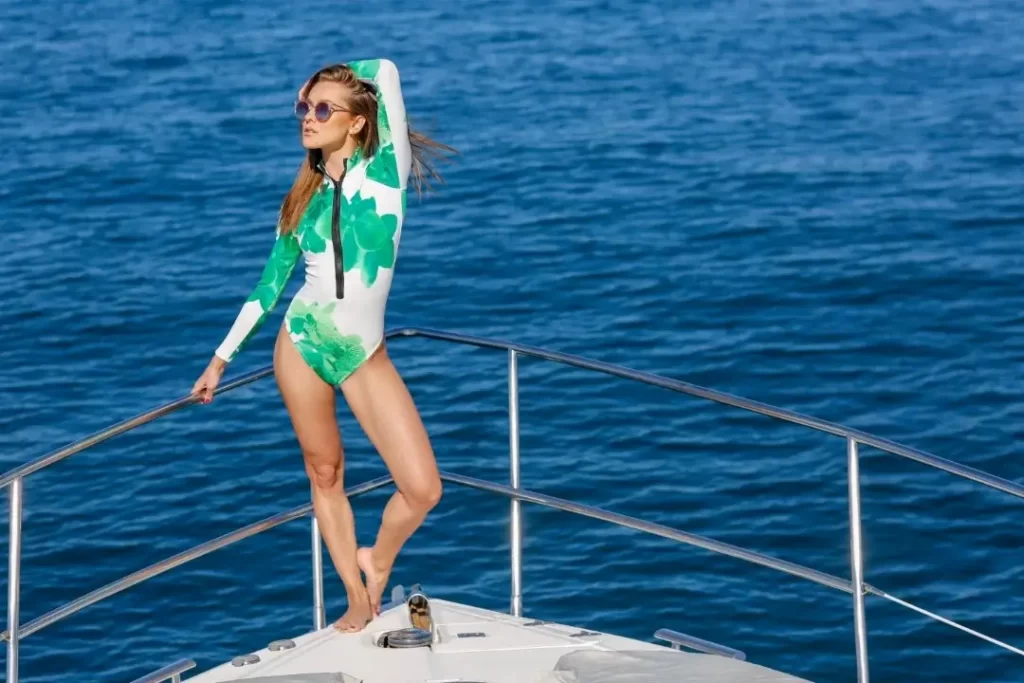
Why Clothing Brands Fail
Top Different Types of Shirts for Women and Men Top Different Types of Shirts for
In the realm of swimwear, everything from style to coziness totally depends on choosing the ideal material. Picking the best fabric for swimwear is a skill that calls for expert know-how, an attentive eye for detail, and a love for creative concepts. Our aim is to offer an all-inclusive guide that delves into the key aspects of swimwear fabric selection, guaranteeing you make a well-informed choice when picking the material for your cherished bathing suit. Looking for the right swimwear fabric can massively influence both looks and functionality, making it crucial to devote enough time and energy to this decision. This blog’s purpose is to give you a deep insight into elements that play a role in swimwear fabric selection and equip you with the knowledge needed to make an exceptional choice. If you want to learn about “How to start a swimwear line” click here.
Navigating the intricate world of swimwear fabrics can be challenging, but don’t worry! We’ve got you covered with several key factors to keep in mind before making your choice. When properly weighed, these factors will guide you toward the ideal material that strikes the perfect balance between style and comfort for an unforgettable swimwear experience.

Before diving into your ultimate swimwear fabric selection, it’s essential to comprehend the advantages and disadvantages of synthetic and natural materials. While synthetic materials might offer enhanced durability and resistance against various elements, natural materials tend to deliver a more delicate touch and better breathability.
To ensure your swimwear fits like a dream, it should possess ample stretch for adapting to your body’s curves comfortably. The perfect fabric should boast excellent elasticity, preventing any sagging or constricting sensation during movement.
Nobody wants their beloved swimwear to wear out after just a few uses. That’s why it’s crucial to pick a material that ensures lasting quality, resists chlorine or saltwater damage, and defends against color fading.
Opt for a versatile and eye-catching fabric that pairs seamlessly with an array of swimwear styles and designs. This will enable you to craft unique, on-trend pieces that truly represent your personality while keeping up with evolving fashion trends.
To maintain your swimwear’s stylish appeal and relevance, stay informed on current and upcoming swimwear fashion trends. Incorporate popular colors, patterns, and designs to give your swimsuit that extra touch of sizzle.
In the end, the perfect swimwear fabric should deliver unrivaled comfort and a fabulous fit, enabling you to glide effortlessly during your much-awaited beach or pool escapades. Invest in a fabric that caresses your skin and complements your figure for a truly delightful swimming experience.
While hunting for the ideal swimwear materials, it’s vital to remain grounded in the reality of your budgetary constraints. Striking a balance between quality and affordability ensures that your selection delivers value for Money without sacrificing comfort and style.

While polyester swimwear provides long-lasting quality and impressive sun protection, it might not be as breathable or soft as some natural fabrics, which could potentially impact comfort.
Nylon is another preferred fabric for swimwear because of its high stretchability, lightweight nature, and resistance to atrophy. Its smooth, silky feel and water-wicking properties make it particularly alluring to those who adore luxurious comfort with their swimwear.
While nylon is a splendid choice when it comes to comfort and flexibility, it is slightly less resistant to chlorine and UV exposure than polyester. It also tends to absorb more water leading to a more extended drying time.
Lycra or Spandex is a widely-used swimwear fabric for its incredible stretchability, body-hugging property, and quick-drying traits. Renowned for its ability to retain its original shape after multiple uses, Lycra is perfect for those seeking a swimsuit that always looks as good as new.
Offering fantastic elasticity and form-fitting qualities, Lycra/Spandex may not be as durable as other options, such as polyester, and its resistance to chlorine is somewhat lower.
Neoprene is really quite remarkable due to its incredible insulating and buoyancy features, which makes it a top pick for all water sports enthusiasts or anyone seeking that extra bit of warmth while splashing about in the water. Plus, this fantastic synthetic rubber boasts amazing elasticity and long-lasting durability and offers solid protection against the sun’s harsh rays.
Neoprene’s unrivaled thermal resistance and excellent flotation can be a game-changer for water sports enthusiasts, but it may feel a bit heavier and bulkier than some other alternatives, reducing comfort and flexibility for casual users.
Xtra Life Lycra is a cutting-edge swimwear fabric recognized for its enhanced resistance to chlorine, providing a swimsuit with remarkable longevity and outstanding shape preservation. This premium material delivers the strengths of typical Lycra (Spandex) while incorporating additional resistance to the harmful effects of pool environments.
Xtra Life Lycra presents a formidable upgrade in durability compared to regular Lycra, as well as enhanced chlorine resistance. Nevertheless, despite these improvements on traditional Lycra, it may still be slightly less durable when compared to polyester.
Through this comprehensive blog on the best fabric for swimwear, we have explored the ins and outs of many swimwear fabrics, guiding you through essential factors and in-depth examinations of the various materials available. It is our hope that the knowledge you’ve acquired here will empower you to make the best possible decision when choosing the perfect fabric for your elegant swimwear ensemble. Informed choices lead to spectacular results, creating a swimsuit-crafting experience that is as enjoyable as it is rewarding.If you want to learn more about swimwear click here.
It’s a good idea to review the fabric specification sheet or contact the manufacturer/seller to learn more about its chlorine/saltwater resistance properties.
Yes! Gently washing your swimsuit with soap after every Use can help eliminate harmful chemicals like chlorine, salt, and sunscreen that can slowly degrade the fabric over time. Remember to hand wash with cold water and avoid using high heat.
Some tips for increasing the longevity of your swimsuit include rotating between several suits to prevent excessive wear and tear on just one, allowing your suit to air dry away from direct sunlight, and following the manufacturer’s washing and care instructions.
Expert Custom Clothing Manufcaturer

Top Different Types of Shirts for Women and Men Top Different Types of Shirts for

What You Must Know About Clothing Samples? Before You Produce a Single Garment: What You

How Much Does It Cost To Make a Hoodie A Complete Cost Breakdown for Custom

Discover the Types of Buttons Discover the Types of Buttons That Transform Style and Functionality
Most Recent Posts
Expert Custom Clothing Manufcaturer
Join our Mailing list!
Get all latest news, exclusive deals and updates.